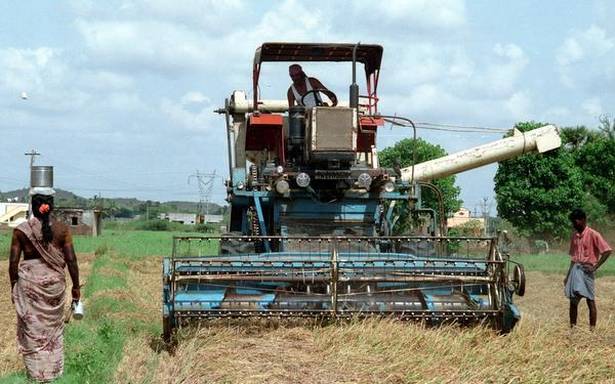Regular use affects the soil texture because of its weight, say farmers
For more than a decade, the combined harvesting machines (CHM) were integral to agricultural activities in the delta districts as a viable alternative to the manual process in the backdrop of manpower shortage faced by farmers.
Over the years, the machines owned by the Agriculture Engineering Department and private entities have almost replaced the manual harvesting process even in landholdings classified as marginal and small. For, farmers with small land holdings hired the CHMs in groups to harvest their crop at one go.
However, the hiring of this service seems to be in trouble what with complaints of overcharging by the private service providers surfacing in the delta districts. Most of the private players act as ‘commission agents’ to owners of harvest equipment in other districts and States.
It was for this reason that the State government intervened and started specifying the hiring charges every year. However, despite the government intervention, complaints of overcharging never abated.
A disadvantageous dimension of the use of CHMs, farmers say, is the threat it poses to agriculture operations – the continuous use of the machines leaves behind an adverse impact on the soil, they point out.
They claimed that regular deployment of heavy CHMs on the fields had almost changed the soil texture which had, in turn, made it difficult for them to have proper transplantation of nurseries using transplanting machines and also through the manual method.
This is due to the solidification of the field in view of the weight of the CHMs. Even the deployment of machines for tilling and levelling have not produced desired results to make the field hundred per cent suitable for smooth cultivation, they say.
Agreeing with them, M. Ramasubramanian, programme coordinator, Krishi Vigyan Kendra, Tiruvarur, says the mini-CHMs which have been viewed as an alternative to heavy machines do have some problems. These mini-CHMs fail miserably on wet fields, he points out.
A progressive farmer, G.Srinivasan of Ganapathi Agraharam, also expresses a similar view, explaining that the mini-CHMs fail to function properly on wet fields, and leave the crop with panicles.
Source: Read Full Article

